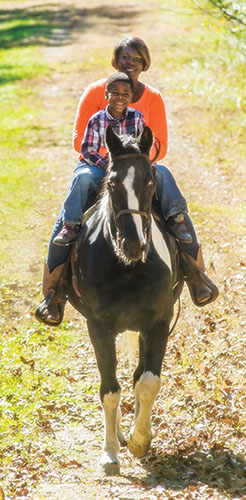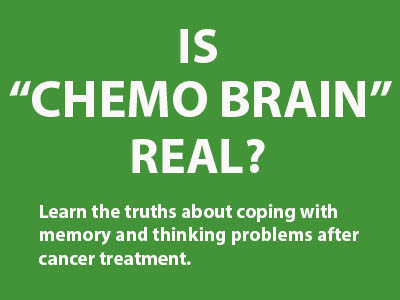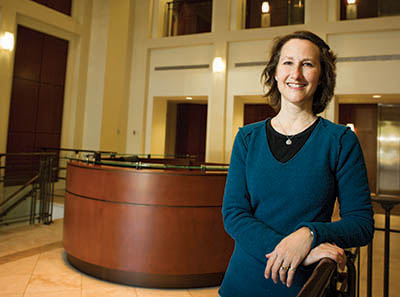Young Breast Cancer Survivors Find Support and Strength
By Nancy Mann Jackson
 |
|
After two mastectomies and reconstruction surgery, La'Rhonda Scott struggled with returning to a normal life until she discovered the Young Breast Cancer Survivorship Network. |
La’Rhonda Scott was diagnosed with breast cancer at 31 years old. The single mother underwent two mastectomies and reconstruction surgery, along with the accompanying emotional turmoil, while attempting to maintain a sense of normalcy for her three-year-old son.
Scott celebrated when she was declared cancer-free, but struggled with how to move forward with a “normal” life—how to dress with one breast, how to discuss what she’d been through with dates and her son, and how to process the ordeal personally.
Theresa “TJ” Bradley was diagnosed with breast cancer when she was 45, “in the prime of my career,” she says. Once her treatments were completed, Bradley worried about how her illness would be perceived at work and whether it would affect her future career opportunities. While she wanted to start getting back to normal, “I did not feel normal,” she says. “I felt fatigued. My wig was hot and itchy. My body was different. My looks were different. My sleep was irregular, further adding to the chronic fatigue. I had survived my cancer and treatment, but now I had to learn to survive the ‘new normal.’”
Young breast cancer survivors—those who are diagnosed before entering menopause—may share the health and body image concerns of survivors at all age groups, but they also face unique challenges, says Karen Meneses, Ph.D., professor and associate dean for research at the UAB School of Nursing, who was named to the Centers for Disease Control and Prevention’s Advisory Committee on Breast Cancer in Young Women in 2013.“These women are starting careers or continuing careers, and they may have lots of questions about what to disclose at work about their health,” Meneses explains. “Some wonder how the disease will affect their ability to have children. Others have young children and must think about how to handle their diagnosis with their children.” Having breast cancer also represents a financial burden for many young survivors, Meneses adds.
Escaping Solitude
Meneses first became interested in how younger women move forward with life after breast cancer as a young researcher in Boston in the mid-1970s. That question became the topic of her doctoral dissertation and has been a research focus throughout her career. She led the seminal Breast Cancer Education Intervention trial, which developed and tested psychological and support interventions to promote the transition from cancer patient to cancer survivor. And when she came to UAB in 2007 and participated in a needs assessment in the region in 2011, she found that young breast cancer survivors in Alabama were still dealing with many of the same issues she had addressed in Boston 30 years earlier.
In 2012, Meneses launched the Young Breast Cancer Survivorship Network (YBCSN) to help women in the Birmingham area deal with the “physical, psychological, emotional, economic, and parenting challenges” they face after they have beaten cancer, she says. The program has a web-based component to accommodate the busy schedules of participants, many of whom are still in the workforce or raising families.
 The goals of the YBCSN “are to provide education, networking, and support for young survivors and their families,” says Silvia Camata, the network’s program manager. “They appreciate feeling that they are not alone and that they are able to get support from women experiencing the same things they are, at the same ages.”
The goals of the YBCSN “are to provide education, networking, and support for young survivors and their families,” says Silvia Camata, the network’s program manager. “They appreciate feeling that they are not alone and that they are able to get support from women experiencing the same things they are, at the same ages.”
Camata, who was diagnosed with breast cancer 11 years ago, is particularly suited to the work of planning and organizing the network’s programs. “Being a survivor helps give me the right insight as to what survivorship feels like as a young mom and a young professional,” she says. “It affects the best years of your life.”
When Meneses and Camata give presentations together, “I talk about the science, and she talks about the reality,” Meneses says. “And people love it.” (See “Chemo Brain" to hear more from Meneses and UAB alumna Diane Von Ah, Ph.D., about one key challenge for survivors.)
Friends in Need
YBCSN’s programs are “very family centered,” which distinguishes them from other programs for survivors, Meneses says. Because young survivors often have spouses and children, including families in the group’s events was a natural decision. In April 2014, the YBCSN will host its second annual conference for young survivors, which will include separate programs for spouses and children.
The YBCSN works in partnership with a number of other cancer organizations throughout Jefferson, Shelby, Blount, St. Clair, and Walker counties. The YBCSN focuses on providing support to young women year-round through monthly “Lunch and Learn” activities, annual workshops for survivors and their families, referrals to supportive services, and ongoing outreach through its website and social media, says Camata.
 |
|
TJ Bradley says the support group meetings organized by the Young Breast Cancer Survivorship Network have been invaluable. |
TJ Bradley learned about the YBCSN at a cancer support group at Shades Mountain Baptist Church. The network’s meetings have been “invaluable,” she says. “First, you realize there are a lot of people your age who have battled or are battling the same cancer as you. These women understand what you are going through and can articulate what you are feeling when others sometimes do not understand. It is definitely not a ‘misery loves company’ group. It is a ‘propping each other up’ group through encouragement, concern, and understanding because we can relate to each other.”
For Bradley, the YBCSN’s most helpful programs have focused on nutrition and exercise. “While I have worked out at a gym nearly my entire life and have been an avid cyclist for the past 16 years, four surgeries and four rounds of chemo in 2012 set me back physically and emotionally,” she says. “It took quite a while to work up the courage to get back in the gym. The ladies at the Survivorship Network encouraged me to start working out and provided resources to ensure I did not injure myself in the process of becoming active again.”
After her breast cancer surgery, La’Rhonda Scott didn’t know how to dress anymore. “I was dressing in layers, trying to cover up my imperfections,” she says. “I’d wear a tankini over the bra I tried to stuff, a t-shirt over that, a sweater over that, then a pea coat and a scarf.”
After an “emotional come-apart,” Scott heard about the YBCSN and decided to visit. At her first meeting, she was introduced to the owner of Touching You in Hoover. There, Scott was fitted with a prosthetic breast and a bra, free of charge. “The owner is a survivor,” and she understood the hassles getting insurers to pay for these services, Scott says. “This helped me regain my confidence.”
After being asked to help lead a panel discussion at the first YBCSN conference in 2013, “my life was changed,” says Scott. “It taught me that my story is needed for other young women.”
Since then, Scott has spoken on other occasions and is now working with Pintopps.com to collect recyclable plastic bottles and containers to help fund mammograms for women under age 35. It’s her way of paying forward the lifeline of support that YBCSN has given her, she says. “They made me realize my story is important and that my life is an inspiration.”
Get Involved
• Learn more about the Young Breast Cancer Survivorship Network.
• Attend the annual Young Breast Cancer Survivors Workshop on April 5, 2014.